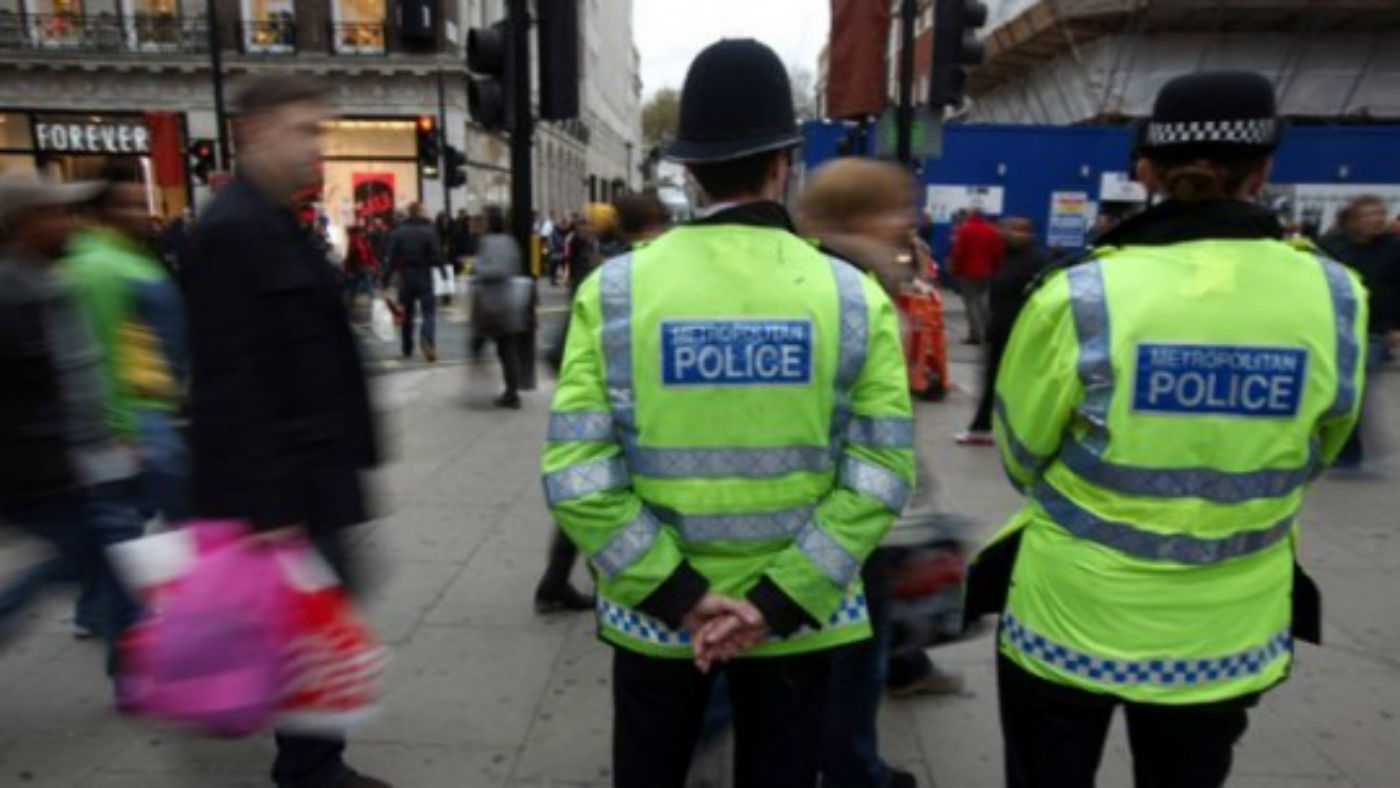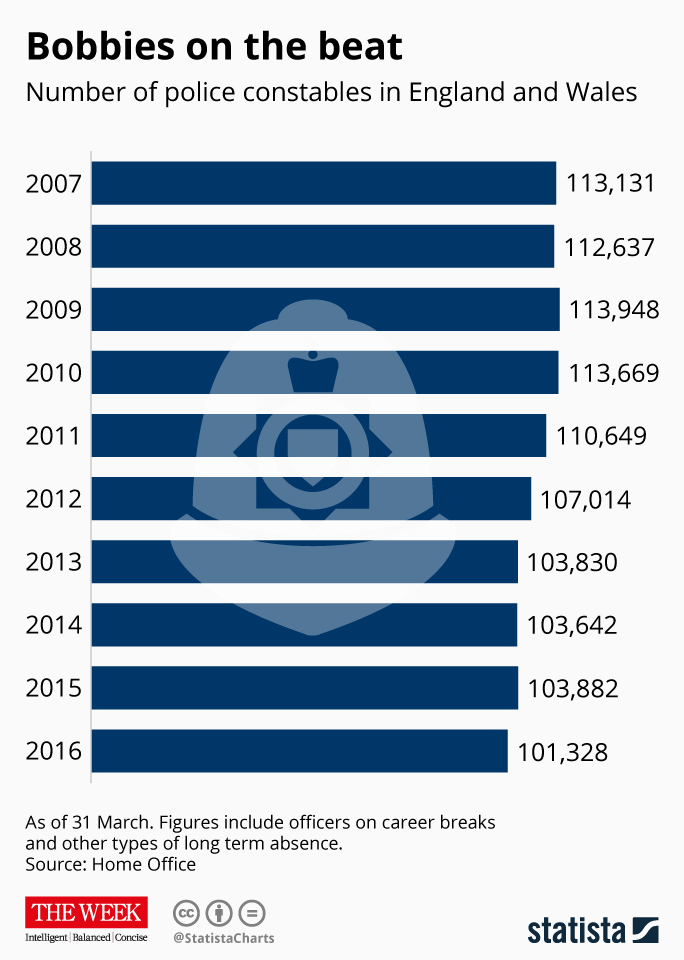The truth behind Labour's policing pledge
Can the party really deliver on its promise to provide 10,000 extra bobbies on the beat?

A free daily email with the biggest news stories of the day – and the best features from TheWeek.com
You are now subscribed
Your newsletter sign-up was successful
Labour has promised 10,000 more police officers on the streets should it win the general election on 8 June.
Under its plan, funding would be provided to recruit the additional officers in community policing roles in every one of the 43 forces in England and Wales – the equivalent of one officer for every electoral ward.
Labour leader Jeremy Corbyn declared that Conservative cuts to policing were "unacceptable".
The Week
Escape your echo chamber. Get the facts behind the news, plus analysis from multiple perspectives.

Sign up for The Week's Free Newsletters
From our morning news briefing to a weekly Good News Newsletter, get the best of The Week delivered directly to your inbox.
From our morning news briefing to a weekly Good News Newsletter, get the best of The Week delivered directly to your inbox.
The extra bobbies on the beat will be paid for by reversing Tory cuts to capital gains tax (CGT), say the party, but the Daily Telegraph, says the idea already "lies in tatters" after shadow home secretary Diane Abbott "struggled to explain how the party would fund the policy" in an interview with LBC.
Home Secretary Amber Rudd dismissed the plan as "nonsensical", arguing that crime has fallen and that Labour has already committed the capital gains tax savings to fund other election promises.
Who is correct?
What are the facts on police numbers and funding?
A free daily email with the biggest news stories of the day – and the best features from TheWeek.com
Police funding fell by 18 per cent from 2010/11 to 2015/16, according to estimates compiled by the National Audit Office.
In comparison, independent fact-checking charity Full Fact says there was a 31 per cent increase in funding between 2000 and 2010.
Meanwhile, "the number of police officers in England and Wales fell by just under 19,000 between September 2010 and September 2016," says the website, taking the number to around its 2000 level.

Has crime risen or fallen?
Rudd told the BBC "crime had fallen by a third from 2010", even though budgets were "being controlled" and there were "less police officers". She said the outcome was "a success."
However, Labour cited a study by the Office of National Statistics (ONS), reported on by the BBC last month, which saw overall crime rise by 9 per cent in 2016.
While some of the increase is thought to reflect changes in recording processes and practices rather than more crime, the ONS said a 21 per cent increase in homicides and 14 per cent surge in knife crime appeared to show "small but genuine increases".
What do the police say?
The Police Federation has cautiously backed Labour's plans, but said more needed to be done.
Steve White, chairman of the Police Federation of England and Wales, told Sky News the service was at "breaking point" and additional funding was needed.
"More officers will go some way to alleviate current pressures, but conditions of service also need to improve - the remuneration and career prospects need to be enticing to attract new recruits in the first place," he said.
[b]Can Labour fund the pledge?
Last year, the government announced cuts to the higher rate of capital gains tax from 28 per cent to 20 per cent and the basic rate from 18 per cent to ten per cent.
Corbyn says reversing this would give a tax boost of £2.7bn.
But both the Tories and the Liberal Democrats disagree and say the figures are flaky and that Labour has already committed to spending this saving.
Between the two parties, "they have identified five other putative uses for this money, in addition to paying for 10,000 extra police officers", reports The Guardian.
These include Labour pledges on bailing out the steel industry and reversing cuts to disability benefits.
Labour says all its election proposals are fully costed and that the specific details will be set out when it publishes its manifesto towards the end of May.
Infographic provided for The Week UK by Statista
-
 Democrats push for ICE accountability
Democrats push for ICE accountabilityFeature U.S. citizens shot and violently detained by immigration agents testify at Capitol Hill hearing
-
 The price of sporting glory
The price of sporting gloryFeature The Milan-Cortina Winter Olympics kicked off this week. Will Italy regret playing host?
-
 Fulton County: A dress rehearsal for election theft?
Fulton County: A dress rehearsal for election theft?Feature Director of National Intelligence Tulsi Gabbard is Trump's de facto ‘voter fraud’ czar
-
 The high street: Britain’s next political battleground?
The high street: Britain’s next political battleground?In the Spotlight Mass closure of shops and influx of organised crime are fuelling voter anger, and offer an opening for Reform UK
-
 Is a Reform-Tory pact becoming more likely?
Is a Reform-Tory pact becoming more likely?Today’s Big Question Nigel Farage’s party is ahead in the polls but still falls well short of a Commons majority, while Conservatives are still losing MPs to Reform
-
 Taking the low road: why the SNP is still standing strong
Taking the low road: why the SNP is still standing strongTalking Point Party is on track for a fifth consecutive victory in May’s Holyrood election, despite controversies and plummeting support
-
 What difference will the 'historic' UK-Germany treaty make?
What difference will the 'historic' UK-Germany treaty make?Today's Big Question Europe's two biggest economies sign first treaty since WWII, underscoring 'triangle alliance' with France amid growing Russian threat and US distance
-
 Is the G7 still relevant?
Is the G7 still relevant?Talking Point Donald Trump's early departure cast a shadow over this week's meeting of the world's major democracies
-
 Angela Rayner: Labour's next leader?
Angela Rayner: Labour's next leader?Today's Big Question A leaked memo has sparked speculation that the deputy PM is positioning herself as the left-of-centre alternative to Keir Starmer
-
 Is Starmer's plan to send migrants overseas Rwanda 2.0?
Is Starmer's plan to send migrants overseas Rwanda 2.0?Today's Big Question Failed asylum seekers could be removed to Balkan nations under new government plans
-
 Has Starmer put Britain back on the world stage?
Has Starmer put Britain back on the world stage?Talking Point UK takes leading role in Europe on Ukraine and Starmer praised as credible 'bridge' with the US under Trump